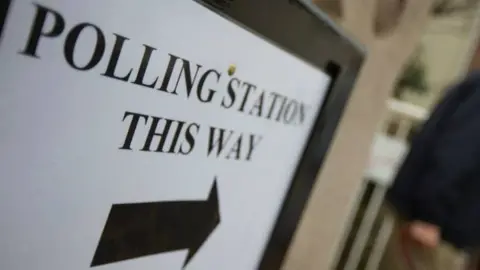Jersey Election 2022: What has changed with voting
 BBC
BBCPeople in Jersey will be heading to the polls on 22 June 2022 to elect the island's next States Assembly.
While there will continue to be 49 politicians in the Crown Dependency's parliament, the way in which many are elected will be different.
So what has changed?
Nine constituencies
There are 12 parishes in Jersey - and, as has traditionally been the case, voters in each will elect a constable to the States Assembly.
So far, so similar.
But the role of senator has been scrapped: rather than eight politicians with an island-wide mandate, there are instead eight more deputies than was previously the case.
Those 37 deputies will be elected from nine constituencies of broadly similar population size.
Some of the constituencies - such as St Clement and St Saviour - are defined by parish boundaries.
St Helier is divided into three constituencies to form St Helier South, St Helier Central and St Helier North.
Other constituencies - such as St John, St Lawrence and Trinity - are formed by the grouping together of parishes.
If you are voting in one of these multi-parish constituencies, you will also be asked to choose a constable for the parish in which you live and deputies to represent the wider constituency.

'None of the above'
In the past, a number of politicians have been elected to Jersey's States Assembly without having to win an election, simply because nobody stood against them.
This year, to ensure this does not happen, an option to vote for "none of the above" has been introduced for the first time.
It will not be possible for every islander to vote for "none of the above".
Instead, the option will this year only appear on eight ballot papers - those for constable of St Saviour, St Clement, St Martin, Trinity, St John, St Ouen, St Peter and St Brelade.
That is because, in each of those elections, there is one position available and only one candidate.
In the other four parishes - St Mary, St Lawrence, St Helier and Grouville - there are more constable candidates than seats available, so voters will not be given "none of the above" option.
If "none of the above" wins in any of the parishes, it will trigger a by-election.

After the election
Once all the results have been counted, verified and confirmed (expected to be in the early hours of Thursday), we could know the names of the 49 people who will form Jersey's next States Assembly.
The change this year means that we may not have all constables confirmed if a "none of the above" vote triggers a by-election.
Those successfully elected are due to be sworn in at Jersey's Royal Court on Monday 27 June.
Elected members will then have until Thursday 30 June to nominate one of their fellow politicians for the role of chief minister.
It will be up the assembly to decide from the resulting shortlist who gets the top job, in a vote due to take place on Tuesday 5 July.
The new chief minister will then reveal their choice for health minister, treasury minister, education minister and all the other ministerial roles, ahead of votes on Monday 11 and Tuesday 12 July.
The new chief minister will not necessarily get who they want.
If another elected politician nominates a different States member for the job in question, and the majority of the assembly votes in favour of that person, the new chief minister will be forced to work with someone they did not choose.
That situation arose during the most recent political term, when Deputy Richard Renouf received more votes from the assembly than Senator Sarah Ferguson to become health minister.

Follow BBC Jersey on Twitter and Facebook. Send your story ideas to [email protected].
